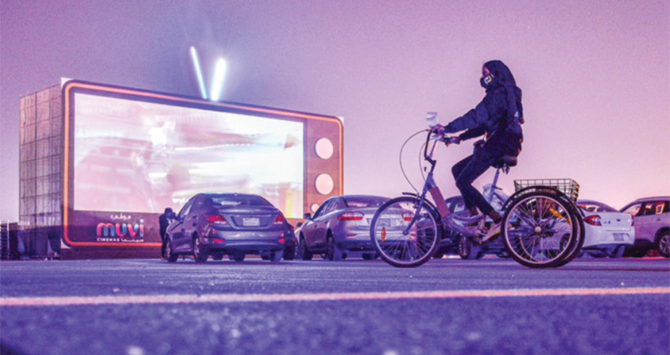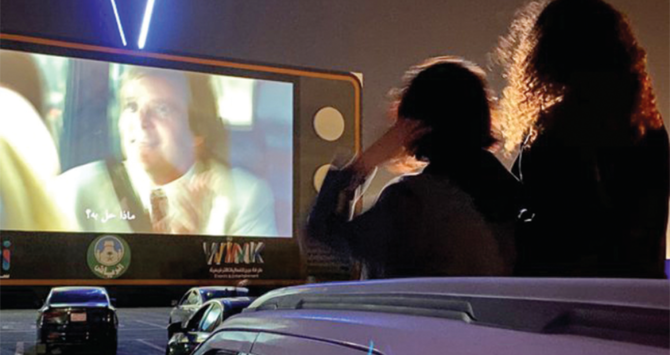RIYADH: The homegrown chain MUVI Cinemas opened a pop-up movie theater in Riyadh, which the company claims is Saudi Arabia’s first drive-in since the nationwide ban on cinemas was lifted in 2018.
The pop-up can accommodate up to 150 vehicles while maintaining social distancing measures, organizers said. Audience members will be required to wear facemasks and have their temperatures checked in accordance with recommended measures to combat the spread of COVID-19. Food and drinks are available to be consumed in visitors’ cars. “MUVI Cinemas is strictly applying all the precautionary measures to ensure a safe environment for our employees and customers,” MUVI’s marketing director, Mahmoud Mirza, told Arab News, adding no decision had yet been made on how long the pop-up would remain open.
According to Mirza, the initial response from the public suggests the drive-in concept will prove as popular in the Kingdom as it has recently in other parts of the Middle East, including Dubai and Beirut, as a way to allow customers to watch movies on the big screen while protecting themselves against the ongoing COVID-19 pandemic.
Riyadh resident Arwa Al-Numair told Arab News that she was looking forward to trying out the drive-in for herself, having seen photographs of it on social media.
“It looks so cool. Just like it does in the movies and on TV. It’s so retro, and a great way to safely see movies during the pandemic,” she said. “I’m overly cautious, so I was very worried about visiting a cinema. But being able to see a movie without even having to leave my car makes me feel more comfortable about taking my family out to see a film.”
Ismaeel Al-Assem, another Riyadh resident, recalled his experiences of visiting drive-in cinemas in the Eastern Province in the early 1970s, before the nationwide cinema ban.
“I remember going to the drive-in on weekends with my friends, getting French fries and burgers from one of the stands and having to listen to the audio via a hose-like cable that you could pull into your car. At the time it was the very height of cool,” he said. “It’s exciting to see them being brought back again. I would definitely like to go and see what’s changed, what’s improved, and what feels the same.”
Mirza said that now is the ideal time to attend a drive-in cinema in the Kingdom. “Drive-in cinemas require many aspects to succeed. One important factor is the weather, and with Riyadh’s weather nowadays, it is a perfect fit to complete an outstanding experience,” he explained, adding that MUVI is considering opening similar temporary venues across the Kingdom.
“Having pop-up cinemas isn’t new to MUVI Cinemas,” he continued. “We shall continue offering such experiences to expand our reach and create happy moments for our audience, be it inside our sites and theaters or outside.”
Mirza also revealed that MUVI plans to open 15 new cinemas in Saudi Arabia this year, adding more than 150 screens to its roster. “New sites will be added to those in current cities, and introduced to new cities, such as Taif, Buraidah and Onaizah,” he said.


















